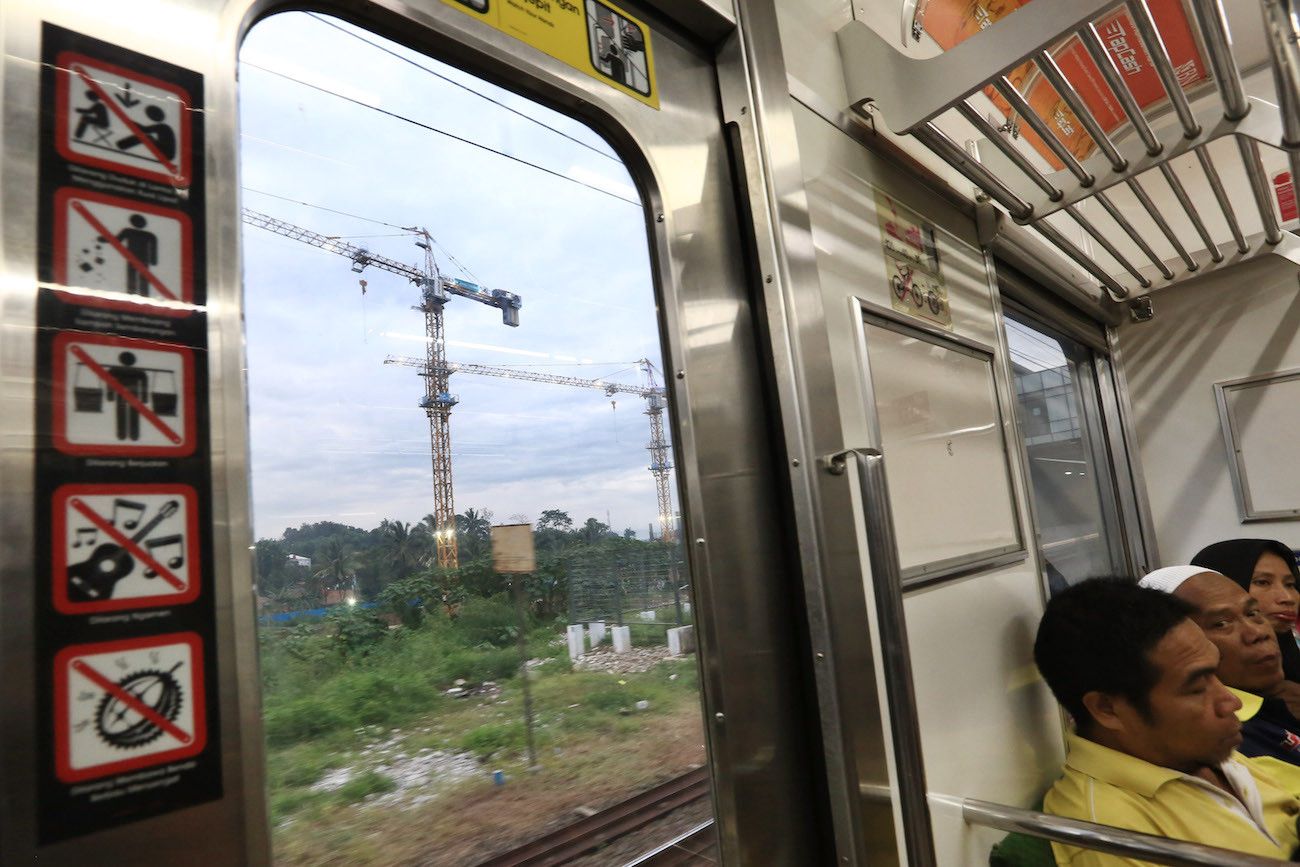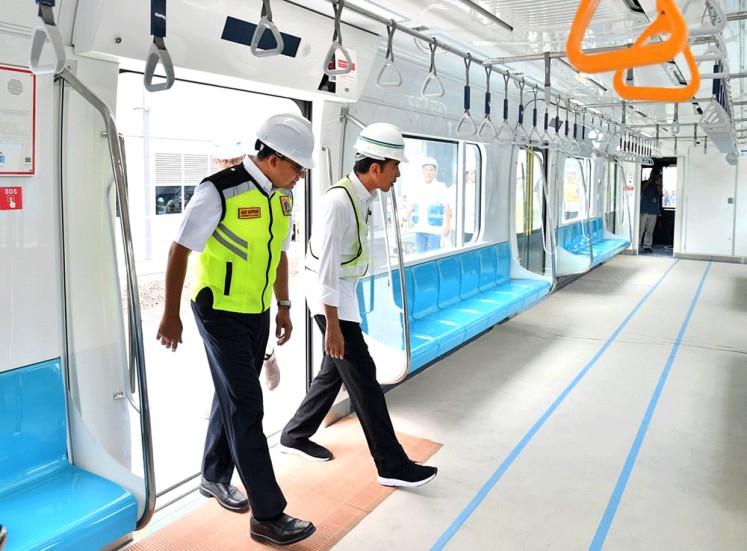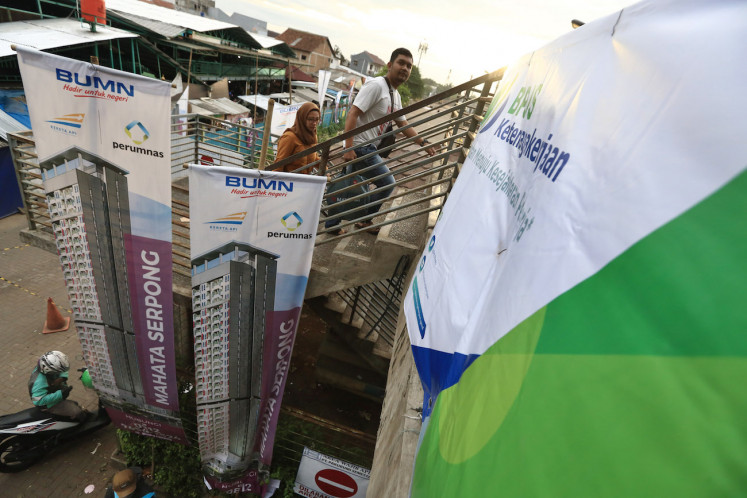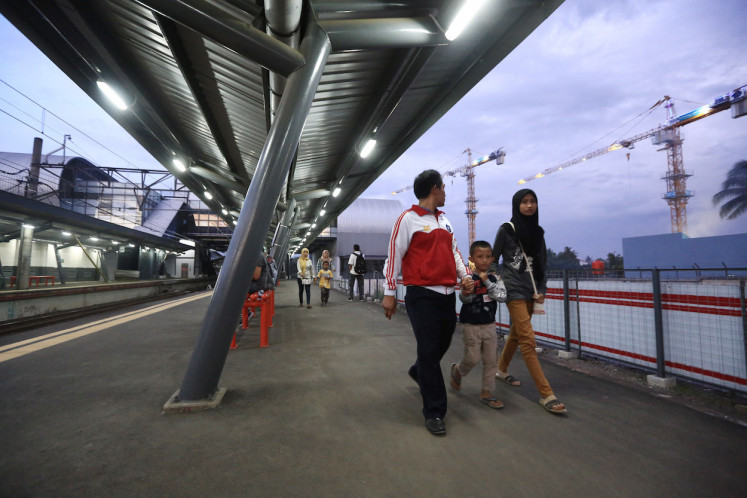Developers see 2019 as good year for building near transit stops
The development of new transit modes such as the LRT and MRT has attracted developers.
Change Size
 Commuter train passengers wait for the train to depart at Cisauk station in Tangerang regency. (JP/Dhoni Setiawan)
Commuter train passengers wait for the train to depart at Cisauk station in Tangerang regency. (JP/Dhoni Setiawan)
P
rivate and state-owned property developers are beginning to see promise in developing projects near public transit stops in Indonesia’s big cities as government and city administrations are pushing for better transportation infrastructure.
Called transit-oriented development (TOD), developers are riding the wave of the lifestyle change of middle- to upper-income bracket urbanites that have begun leaving their cars in their garage and taking trains, buses and soon light rapid transit (LRT) and mass rapid transit (MRT) to work.
A decade ago, property agents would not put the short distance from a house to a public transit stop as a perk in their brochures. Nowadays, “walking distance” to a bus stop, commuter train, LRT or MRT station, has become something an agent will mention to potential buyers. Developers are also beginning to see the proximity to public transit, especially newer ones like the LRT, as a selling point.
It seems that the government has also put their weight behind such developments. In a speech at the Presidential Palace on Tuesday, President Joko "Jokowi" Widodo called on stakeholders to streamline the management of TOD infrastructure, which he said had been inefficient for years because too many institutions were handling it, citing the overlap in management between the Jakarta, West Java and Banten administrations, as well as the State-Owned Enterprises Ministry and Transportation Ministry.
Consumer preference
Private property developer Ciputra Residence, a subsidiary of Ciputra Group is confident that property projects built with the TOD concept will be booming next year. In a TOD concept, developers usually design a mixture of housing, office and retail, located within walking distance of public transportation links.
“The government has been focusing on building mass transportation to reduce congestion and pollution. As a property developer, we believe that consumer preference for housing will change alongside the shift in their preference for transportation,” Yance Onggo, Ciputra Residence associate director, told The Jakarta Post.
Observing the government’s massive infrastructure development, Ciputra Residence is confident that its township development in Citra Maja Raya, located near Maja commuter train station in Tangerang regency, will be attractive to consumers. Citra Maja Raya is located 80 kilometers west of Jakarta, and has a land area of 2,600 hectares.
So far, Ciputra Residence has developed 600 hectares in Citra Maja Raya within 3.5 years and sold 14,000 homes. The houses were priced between Rp 168 million and Rp 450 million. The property firm plans to set aside Rp 750 billion to construct 3,500 homes in 2019.
New mode, new development
In 2019, Jakarta alone is expected to see the completion of the country’s first ever MRT system in March. An LRT system from state-owned construction firm PT Adhi Karya (ADHI) from Cibubur, East Bekasi and Dukuh Atas to Cawang and another LRT project by Jakarta-owned PT Jakpro from Kelapa Gading in North Jakarta to the Jakarta International Velodrome in Rawamangun, East Jakarta will follow.
 Anies Baswedan enter an MRT train at Bundaran HI Station on Tuesday for a test ride to Lebak Bulus Station. The first phase of MRT construction is reportedly 97 percent complete and the service is expected to begin operating in March 2019.">
Anies Baswedan enter an MRT train at Bundaran HI Station on Tuesday for a test ride to Lebak Bulus Station. The first phase of MRT construction is reportedly 97 percent complete and the service is expected to begin operating in March 2019.">
Publicly listed ADHI even set up a subsidiary called PT Adhi Commuter Property, which is building LRT City in seven locations, all near the LRT stations.
Ciputra is also building Citra Sentul Raya on a 1,000-hectare area near LRT Sirkuit Sentul station in West Java. The project will be a joint operation between Ciputra Residence with PT Tridaya Semesta and PT Sarana Golf Utama.
Another developer, Japan’s Daiwa House Industry is building a superblock on a 10-hectare plot of land near Ciracas LRT station in East Jakarta. Cooperating with Japan Overseas Infrastructure Investment Corporation, the company will name the project Sakura Garden City, which will have 5,000 homes and commercial premises in 12 towers.
PT Daiwa JOIN director Tubagus Nouval Haedar said as quoted by kompas.com in April that Sakura Garden City was the biggest transit-oriented development property built by a Japanese firm in Jakarta. “Our location is right across from Ciracas LRT station. This will give tenants good mobility to go to Jakarta and Bogor,” said Tubagus.
The country’s first LRT in Palembang, South Sumatra has also attracted new property investments. Spanning about 25 kilometers, the LRT connects the city’s airport to Jakabaring Sports City. Developer Terrakon Property in 2017 was planning to build a residential area “500 meters from Jakabaring LRT station”.
Old ones are attractive, too
The existing public transit modes, meanwhile, have seen a steady increase in passengers. In 2014, Greater Jakarta’s commuter train, operated by PT Kereta Commuter Indonesia, saw 208.5 million passengers. The number increased by 51 percent to 315.8 million in 2017 and this year the company targeted 320 million passengers.
The Transjakarta bus service experienced 29 percent growth from 2014 with 111.9 million passengers to 144.7 million in 2017. This year, it posted an ambitious target of 212 million passengers.
State-owned company PP Properti, a subsidiary of PT PP, plans to build two apartment towers near Juanda commuter train station, Central Jakarta. One tower will be made into a low-cost apartment block under the housing loan liquidity facility (FLPP) scheme, while the second tower will be sold commercially.
“We are focusing on building TOD Juanda and will start with the soft launch this December,” Indaryanto, PP Properti finance director, said over the phone, explaining that the company was currently in the process of completing the permit to build the apartment buildings.
Besides TOD Juanda, other projects in the pipeline include TOD apartments near Tanah Abang station and Manggarai station in Jakarta. The company also has a plan to develop TOD concept property at Gubeng station in Surabaya.

Another state-owned property developer, Perum Perumnas, has also been focusing on building properties with a TOD concept. Some will even be built not just near the stations, but on top of them, in cooperation with state railway company PT Kereta Api Indonesia (KAI). They are planning to build apartments in Tanjung Barat station in South Jakarta, Pondok Cina station in Depok and Rawa Buntu station in South Tangerang.
“The majority of demand for housing comes from Greater Jakarta, that’s why the concept of TOD is very popular now; building apartments on top of train stations,” Bambang Triwibowo, Perum Perumnas president director, said.
Bambang said the company saw a lot of enthusiasm from consumers for its TOD in Tanjung Barat station, as from 1,200 apartments offered, the demand had surpassed 1,700.
The State-Owned Enterprises Ministry announced in December that it had called on three state-owned enterprises to build TOD concept properties in South Tangerang, namely Perum Perumnas, which is to build property near Rawa Buntu, Hutama Karya near Jurangmangu station and ADHI near Cisauk station.

The ministry said the total investment to build those properties would reach nearly Rp 6 trillion. In detail, that is Rp 2 trillion for properties near Jurangmangu railway station, Rp 3 trillion for properties near Rawa Buntu station, and Rp 831 billion for properties near Cisauk station.
Cisauk station, located in a rural area that was considered remote years ago, has undergone a facelift by private developer PT Sinar Mas Land, which has a new development in the area, including AEON Mall and BSD Digital Hub.









